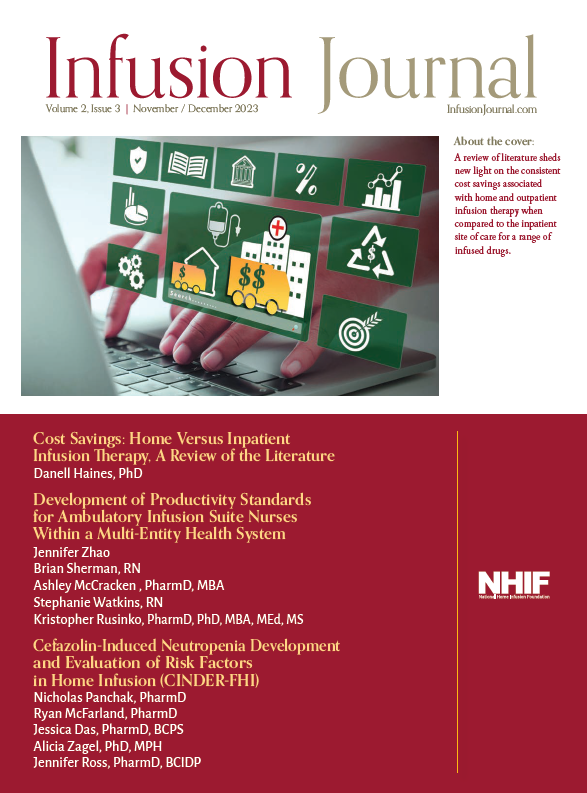Michelle Simpson, PharmD, BCSCP, MWC | Editor-in-Chief, Infusion Journal
Understanding financial decisions for choosing the site of care for infusion therapy can leave patients and providers feeling like they are given limited options. Determining the proper site of care for infusion medication administration is a growing challenge with complex reimbursement decisions. Reimbursement for the same medication could be higher, lower, or not reimbursed due to where it was administered.1 Too often, insurance benefit design and the patient’s potential financial responsibility weigh heavily in the decision-making process.
When receiving a referral, home infusion providers are trained to assess the patient and treatment plan. The pharmacy and nursing team can evaluate the site of care based on clinical information and financial outcomes as part of coordinating care with the patient’s insurance. Based on payor restrictions and patient characteristics, one of these locations may be a better option, either financially or clinically.
The care coordination model in home infusion has been effective in providing explanations of financial responsibilities to patients and keeping patients involved in their site of care decisions. NHIF collected patient satisfaction survey data and established home infusion industry benchmarks for satisfaction. For the question, “I understood the explanation of my financial responsibilities for home infusion therapy,” the 2022 benchmark was 89.85% of patients who responded “yes” to understanding their financial responsibility for their home infusion therapy.2,3
As part of ongoing care coordination, the patient’s eligibility is verified, and the treatment plan is updated. Data collected on the status of patients discharged from home infusion services reported higher rates of the reasons “change in eligibility” and “change infusion provider” in patients who were discharged for therapy types that included specialty drugs.4,5 The increasing number of specialty medication approvals coupled with the high cost of these medications has become a target for reducing health care costs through site of care optimization.
Site of care costs will influence financial decisions. The article in this issue of Infusion Journal by Danell Haines, titled, Cost Savings: Home Versus Inpatient Infusion Therapy, A Review of the Literature, evaluated the current evidence available for cost comparison of infusion medications administered in the hospital setting compared to the home or alternate site. The literature review was specific to data collected in the United States since it would not be a balanced comparison to analyze U.S. health care cost results against other countries due to significant differences in the health care systems.
The author’s conclusions found consistent cost savings associated with home and outpatient infusion therapy compared to the inpatient SOC for a range of infused drugs. The author performed an extensive search with open search dates. From 1988 to 2023, only 6 articles met the inclusion criteria for the literature review. Four of the 6 compared outpatient anti-infective therapy (OPAT) to inpatient or hospital-based care. The author provided a count of excluded articles from outside the U.S., and it is worth noting that the amount of research available from single payor systems was more widely published.
While Haines’ findings do not come as a surprise for home and alternate site infusion professionals, there is an obvious need for research in reimbursement and cost analyses of health care by site of care.
Promoting evidence-based research is at the heart of our mission, and Infusion Journal is interested in publishing cost-related research in home infusion. As the pipeline of specialty infusion medications grows, it represents an area for large savings and an opportunity for site of care research. Infusion Journal maintains a list of suggestions for research in relevant areas of interest in home infusion.6


